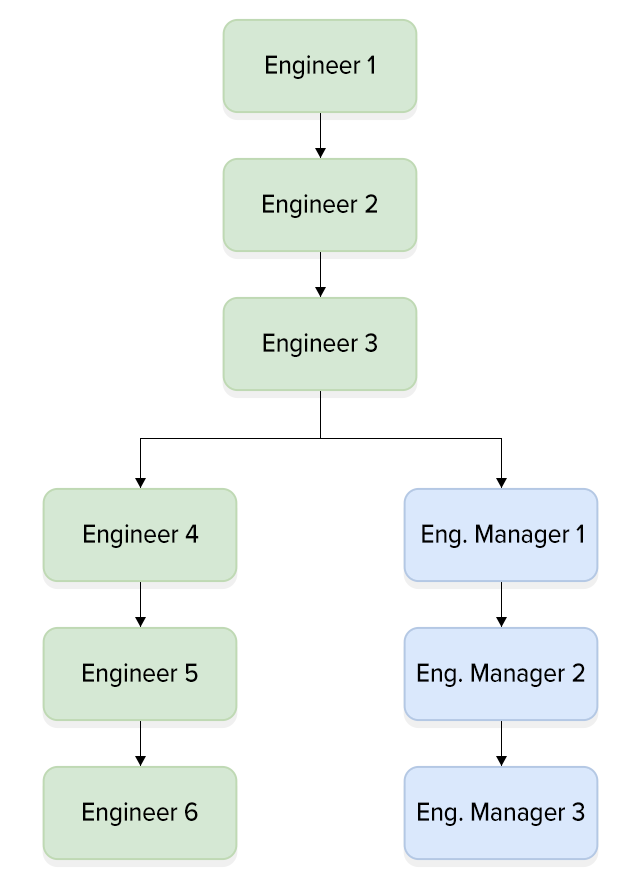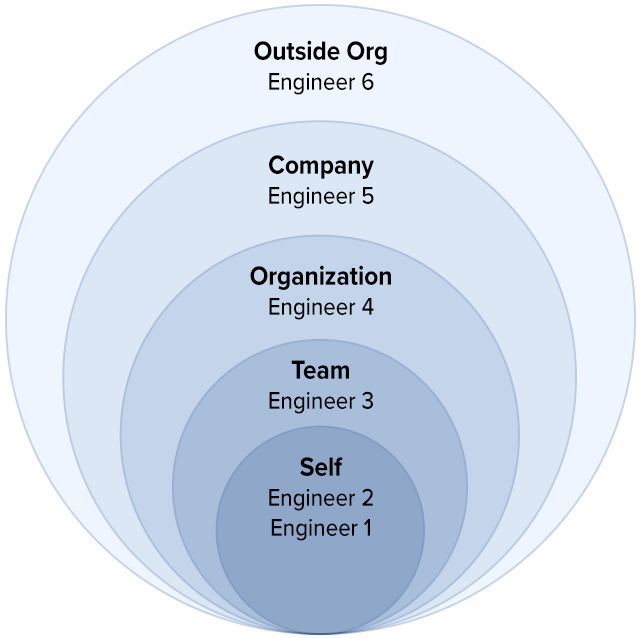

Our Career Progression Framework
by Erwin Alberto
In the last year, Outschool has experienced tremendous growth. We’ve grown from 20 people to over 100. Our engineering team went from 8 people to 35 in that same time frame. Though that kind of growth is exciting, it also made us rethink how we should support our teams. To do that, we introduced a career progression framework.
As a small startup, it wasn’t necessary for us to have a specified career framework. The team was more focussed on the goal of delivering the product and not so much on career development. With a growing team, we anticipated that we would need a framework to talk about career growth. Indeed, as the team started to get bigger, conversations around career aspirations and goals started to happen. These career conversations not only happened with our current engineers but it also came up with engineering candidates during the hiring process. Subsequently, we came to the realization that we needed to help our engineers and candidates envision their future at Outschool. In order to do this, Outschool put together a career progression framework.
What is a career progression framework?
A career progression framework is meant to provide clarity and structure to employees and their manager on how to navigate career development. It helps outline the path(s) an employee can take as they develop their career within the company. It describes different career levels and provides detailed information to map out a path from one level to another. The framework consists of roles, competencies, skillsets and behaviors expected out of an employee at each level.
How did we build our career progression framework?
The first step was to define the career tracks. We understood that not all engineers wanted to grow in a career where people management is the main responsibility. We wanted a career track where technical leadership is just as equally valued as people leadership. So, to give our engineers options when progressing in their career, we created an Individual Contributor track and a Management track.

After creating the career tracks, we identified what competencies and behaviors engineers need to be successful at Outschool. When doing this, we made sure that those competencies and behaviors were consistent with Outschool’s cultural values because we want all of our engineers to embody those values. Here are the competencies and behaviors that we crafted:
| Competencies | Behaviors |
|---|---|
| Domain Knowledge | Expertise, Code Quality, Testing, Debugging, System Architecture, Process Thinking. Growth Mindset |
| Collaboration | Communication, Feedback, Relationship Building, Teamwork |
| Execution | Prioritization and Dependencies, Project Management, Problem-Solving, Data Analysis, Creativity |
| Leadership | Ownership, Economic Thinking, Initiative, Mentorship |
| Customer Focus |
The next step was to define the details for each competency and behavior for the different levels. When doing this, we looked at it from the perspective of the type of impact that we want our employees to have at each level.

Here is the general direction that we followed when defining the behaviors for each level:
Engineer 1
- An engineer at this level is still learning how to be autonomous within the team. The area of focus is to improve as an engineer. Some examples of this could be learning how to troubleshoot and debug issues, writing tests to increase test coverage, or knowing when to zoom out to think about how the code fits within the context of the system as a whole.
- At this level, an engineer’s career progression is expected to be faster compared to the higher levels.
Engineer 2
- An engineer at this level has a good understanding of programming and is able to autonomously execute on projects within their team’s areas of responsibility. Although the focus is still on how to improve as an engineer, an engineer at this level is also beginning to expand impact to other engineers in the team. This is when the engineer starts to work with others in their functional areas. An engineer may be working with other engineers, designers, data scientists, researchers, managers and others to ensure that they understand the work so that everyone is on the same page. Additionally, an engineer in this level may spend mentoring less experienced engineers and helping them learn best practices in coding.
- At this level, an engineer’s career progression is expected to be faster compared to the higher levels.
Engineer 3
- An engineer at this level is able to lead complex projects within their team’s area of responsibility. At this level, the engineer is sometimes leading and or mentoring other engineers and proactively looking for ways to improve how the team works.
- This is the level where progression often slows due to the amount of learning and experience required. This is the first point of the career progression framework where an engineer can stay for a while.
- This may also be the level at which the engineer starts to consider which of the two tracks to pursue. Either the engineer will continue the IC track or switch over to the people leadership track.
Engineer 4
- An engineer at this level is defining and leading complex work across teams, amplifying impact through other people and proactively seeking and creating opportunities to be effective beyond their own team.
- This is the level where the engineer is leading cross functional projects that impact multiple teams. They initiate and successfully drive challenging initiatives that cut across multiple team’s work, projects and processes.
Engineer 5
- An engineer at this level amplifies impact through other teams by creating opportunities to be effective throughout the entire organization.
- This is the level where the engineer is defining and leading complex projects across the organization with multiple teams involved. They initiate and successfully drive exceptionally-challenging initiatives that cut across the organization’s technical areas, projects and processes.
Engineer 6
- An engineer at this level is amplifying their impact not only through the entire company but also outside of the company.
- The engineer contributes to strategy on broader organizational design, and proactively considers team design and skills integration ahead of any hiring. They consider the economic impact of every product, process and team decisions as well as the cost/benefit analysis of those decisions.
Why is a career progression framework important?
Engagement
A good way to make sure that employees are engaged is to give them insights into their own skills and competencies and how those qualities can be leveraged to progress in their own careers.
Transparency
A career progression framework outlines what success looks like. It provides transparency around what is expected of the employees. Conversations about what it takes to progress in an employee’s career becomes a collaboration between the manager and the employee.
Minimizing Bias
Employees that belong to underrepresented groups face a greater challenge when it comes to career progression if the criteria is not clear. A transparent career progression framework helps level the playing field by ensuring that all employees are treated fairly and consistently.
Growth and Development
Our mission at Outschool is to “inspire kids to love learning.” We want to extend that mission to our employees through the career progression framework. The framework emphasizes learning as a means to grow and develop at Outschool.
Recruiting
We want to show candidates that Outschool cares about their personal and professional development and that we provide a structure to foster growth.
Retention
There have been studies that show that stagnation in a role is one of the big drivers for employee turnover. According to a research study done by Glassdoor, “every additional 10 months an employee stagnates in a role makes them 1 percent more likely to leave the company.” Employees who stay in a job without any career progression are more likely to look for their next step at another company. A career progression framework that shows employees a clear career path will increase the likelihood that employees stay in the company.
We created the career progression framework because career development isn’t just something we talk about at Outschool; it is something we are very serious about. We know that a well defined career path helps create meaning and purpose for employees at all levels. We believe that it is important to give employees a way to see what their future could look like at Outschool.
